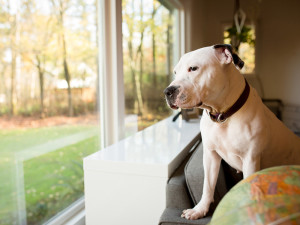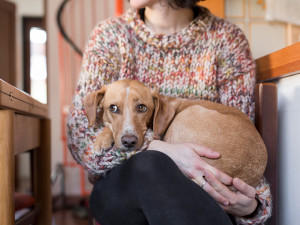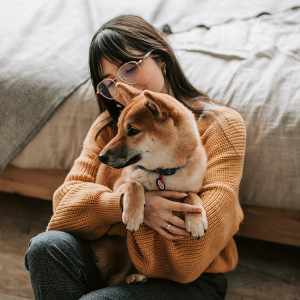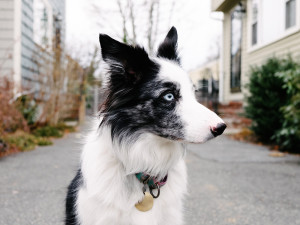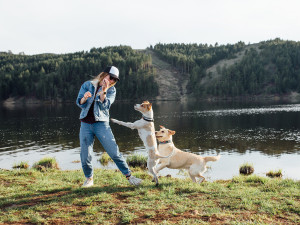Does Your Dog Need Anti-Anxiety Meds?
How to cope with dog anxiety—from training to medication.
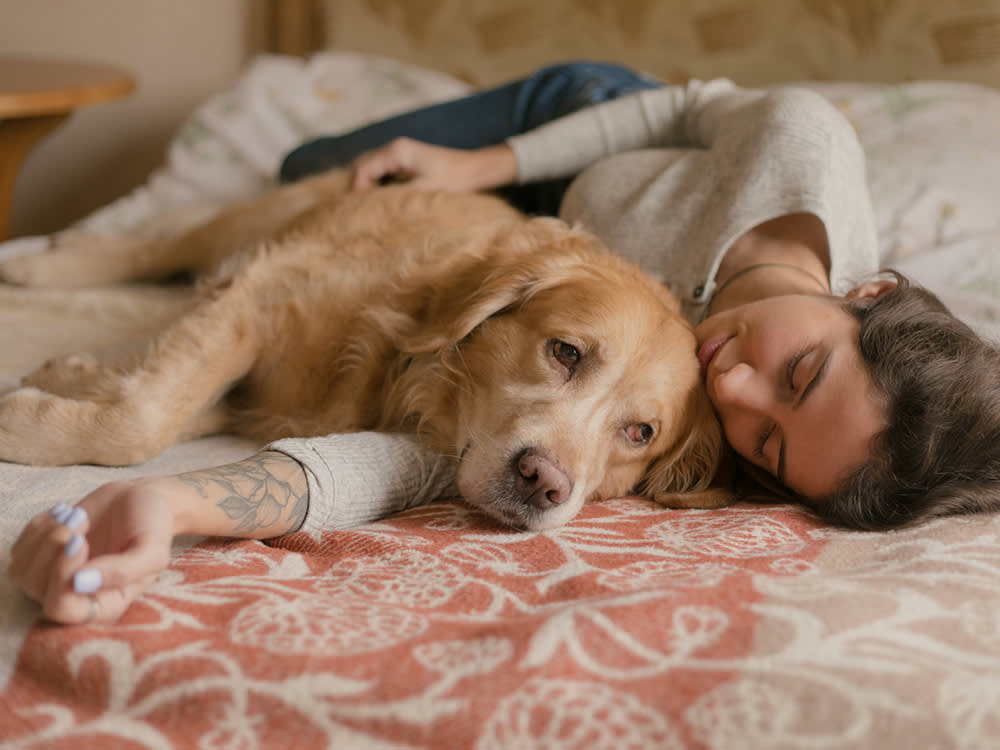
share article

Your pet wants you to read our newsletter. (Then give them a treat.)
In this Article:
Signs of Depression or Anxietyopens in a new tab Common Causes of Anxietyopens in a new tab Training to Help Anxiety opens in a new tabNatural Remedies for Anxietyopens in a new tab When Anxiety Meds Can Helpopens in a new tab Talking to Your Vet About Anxietyopens in a new tab
The importance of protecting our mental health has gotten a lot of press in recent years, thanks (no thanks!) to a global pandemic — and all the nerves and isolation that came with it. But humans aren’t the ones who need to protect our mental wellbeing; our pups can experience anxiety, too. Their lives might look cushy to us (we’re paying their rent, after all), but trauma, lack of socialization, and just plain-old noisy thunder opens in a new tabcan have real effects on your dog’s psyche.
So, how can you help your dog with their anxiety? We asked a few veterinarians how they diagnose anxiety in animals, what behavioral changes pet parents should make first, and when it’s time to think about prescribing Prozac. Anti-anxiety medication may be an option for dogs with severe anxiety that interferes with their daily lives. Talk to your veterinarian to determine if medication is right for your dog and to choose the correct type and dosage. Be aware of the potential side effects, such as drowsiness and decreased appetite.
Signs of depression or anxiety
Depression in dogs often mimics that in humans: They will act withdrawn or isolate themselves, they’ll lose interest in activities they usually love, and there will be changes in their appetiteopens in a new tab or sleeping habitsopens in a new tab. On the other hand, unaccountable aggressionopens in a new tab, accidents in the house despite being potty-trainedopens in a new tab, and other destructive behaviors all point to anxiety. “There are a number of behaviors a pet parent may see, including pacing, excessive panting, trembling, whining or vocalizingopens in a new tab, holding the tail down, and lickingopens in a new tab parts of the body excessively, such as the front paws,” veterinarian and The Wildest Collective member Dr. John Iovinoopens in a new tab says. “There can be many other odd behaviors that don’t fit the normal, which can also allude to potential anxiety, such as escapist behavior.”
These signs can signal a medical condition, so if your dog isn’t acting like themself, the first step it to get a full workup at your vet to check for any underlying causes. Until then, don’t try to snap your pet out of their sulk when they could be suffering from arthritisopens in a new tab or an illness. Once your vet rules out health issues and injuries, you can take anxiety or depression into account.
Common causes of anxiety
Does your pet go wild when you leave them alone, chewing everything from wires to the wall from stress? Or does the sound of a car backfiring or Fourth of July fireworksopens in a new tab leave them cowering in a corner, unable to shake the fear? A 2020 studyopens in a new tab found that 72 percent of dogs suffer from anxiety — with separation, fear of strangers, and sensitivity to noise to blame for most of the cases. Same, dogs, same.
“One common reason [for anxiety] is lack of socialization as dogs grow and develop,” Dr. Iovino says. “The more events and experiences a dog can have, the calmer they can be when challenged with negative experiences. In addition, dogs can develop fear or anxiety towards other dogs if they have a bad experience such as getting into a fight with another dog.”
Other causes include “separation anxiety, noise phobias, and sometimes even items of clothing, like a hat,” veterinarian Dr. Seth Vredenburg adds. “There are so many things that our dogs may see as strange or unusual that can cause some level of anxiety. How we react to these things may influence our dog’s reaction.”
How common is anxiety in dogs?
Depression in dogs is less common, and thus less often treated medically. But big changes in the household — from the addition of a new pet to the loss of another petopens in a new tab — can cause a dog to become despondent. Unlike us, pets usually bounce back quickly from depressive episodes, and rewarding happy behavior, such as playfulness and a wagging tail, will hasten the healing process. If their mood doesn’t lighten, a vet may prescribe medication as a temporary measure to take the edge off.
How can you treat anxiety in dogs?
Many veterinarians will recommend making behavioral changes first to see if that alleviates your dog's anxiety. Use different techniques and training depending on the type of anxiety — separation or situational, for example. You can look into natural remedies, such as exercise and even massage. If you do want to pursue medication, it's best to do so alongside the help of a trainer or behaviorist who can support your dog during the process.
Training before medicating
Dr. Sara Ochoa, a veterinarian at Whitehouse Veterinary Hospitalopens in a new tab, recommends making behavioral changes before resorting to medication. “[For separation anxiety] start by training your dog to learn to stay home alone. This usually starts with leaving for a few minutes at a time, then coming right back inside,” she says. “Going forward, don’t make a big deal when you leave the house and slowly increase your time away as your dog gets more comfortable. And if you come home and they haven’t been destructive, reward them with praise and a treatopens in a new tab.”
For situational anxiety, removing your dog from what’s triggering them may seem like an obvious solution. But if the phobia is unavoidable, like fireworks, a Thundershirtopens in a new tab, CBD treats, and calming pheromones like Adaptilopens in a new tab can alleviate some anxiety. “Long term, what will mostly help calm a dog down during anxious events is working diligently to desensitize them to this fear through training techniques,” Dr. Iovino says. “This process can take weeks to months before you see less anxiety.”
Natural remedies for anxiety in dogs
There are several natural remedies you can try out to see if they alleviate your dog's anxiety: starting with the simplest solution for many pups, which is exercise! Making sure your dog gets enough physical activity during the day can help relieve their stress and anxiety. Another pretty easy remedy is attention: give your dog plenty of affection (if they appreciate it) and training time to wear off some of that nervous energy and make them feel engaged. Natural remedies also include relaxing massage (yes, there are dog masseuses!) and acupuncture, which can relieve anxiety. Some dogs are also receptive to calming music—you can find playlists on YouTube like thisopens in a new tab.
When anxiety meds can help dogs
Does your dog need anxiety meds? Anti-anxiety medication can put your dog in a calmer state of mind so that they’re able to better absorb the training, but medication isn’t a silver bullet. If you don’t have a lot of dog training experience, it’s probably a good idea to hire a professional behaviorist. “Just putting your pet on medication isn’t enough — you have to change their behavior as well — but it can help,” says Dr. Ashley Rossman, a veterinarian at Glen Oak Dog and Cat Hospitalopens in a new tab.
When should you talk to your veterinarian about anti-anxiety medication for your dog?
When you have tried training and natural techniques and nothing is working to minimize your dog's anxiety, you should consult your vet. Ask your vet to examine your dog if they continue to have anxiety after four to six weeks of attempting prevention techniques. Your vet should be able advise on whether to consider anti-anxiety medication based on their assessment of your dog’s anxiety symptoms.
How does anxiety medication work for dogs?
Generally, anti-anxiety medication works by boosting the levels of chemicals called neurotransmitters in your dog's brain. They boost the levels of norepinephrine, serotonin, dopamine, and gamma-aminobutyric acid (GABA) by increasing their production or by blocking them from being reabsorbed into nerve cells. These changes in the dog’s brain reduce symptoms of anxiety over time.
What are the types of anti-anxiety medication for dogs?
There are different types of antidepressants drugs for dogs, it depends on the situation and their symptoms. Your vet will likely consider canine anxiety drugs, such as Prozac, Xanax, Amitriptyline, Buspirone, Clomicalm, Sileo, Valium, Ativan, Paxil, and Zoloft. If a few of these sound familiar, it’s because some human anti-anxiety medication has been FDA-approved for use in dogs — but don’t give your dog your pills, because they can have awful side effects including increased anxieties and irregular heart rate when not prescribed and dosed by a licensed veterinarian.
Dr. Ochoa typically turns to Prozac for separation anxiety and aggression. If your pet has more intermittent anxiety (again: fireworks), she’ll opt for calming Trazadone. “Some dogs also need a calming medication when they go to the vet’s office or groomer,” she adds.
What are the side effects of anti-anxiety medication in dogs?
Although anti-anxiety drugs are generally well tolerated in dogs, side effects of anxiety medication vary depending on the type of drug, dosage, how long they’ve been taking it and your pup’s sensitivity to it. Side effects of long-acting drugs, such as Tricyclic Antidepressants, can include sedation, dry mouth, lack of appetite, vomitingopens in a new tab, and diarrhea. Another class of long-acting drugs for dogs called selective serotonin reuptake inhibitors (SSRIs) has fewer side effects also including sedation, loss of appetite, and changes in behavior.
By comparison, short-acting anti-anxiety medication can be used when dogs are triggered in certain situations such as thunderstorms or going to the vet. These include benzodiazepines, which are sedatives that can calm your dog down if they have separation anxiety, for example. Side effects include sedation and sleeplessness. Another class of short-acting medication is called Trazodone, an antidepressant that affects serotonin levels. Reported side effects include lethargy, hyperactivity and aggression.
Long-term treatment
Prozac may not be a DEA-controlled substance and is generally well-tolerated by humans and animals alike, but all medication requires monitoring. “I like to check bloodwork at least once a year when dogs are on it,” Dr. Rossman says. It isn’t a quick fix either. Some dogs will need anxiety medication for the rest of their lives, while others can be weaned off it if they respond to training.
Ultimately, it depends on the individual dog and the severity of their behavior. Dr. Rossman adds: “Sometimes it takes a couple of weeks to hit a steady-state level, so dogs are normally [medicated] for at least a few months to get a feeling for how it’s working. It’s a long-term commitment.”
Disclaimer alert: This article is here to share information. But, much like pineapple on pizza, the topic may be controversial. Meaning, not all vets or pet professionals agree. Because every pet is a unique weirdo with specific needs. So, don’t take this as fact or medical advice. Talk things over with your vet when making decisions, and use your best judgment (about both your pet’s health and pizza toppings).
FAQs (People also ask):
1. What are some common situations that may trigger anxiety in dogs?
Dogs who suffer from situational anxiety may be triggered by car rides, trips to the vet or groomer, thunderstorms, fireworks, being boarded, or being around loud childrenopens in a new tab.
2. Can I use anti-anxiety medication as a short-term solution, such as for travel anxiety?
If your pet has more situational anxiety, caused by fireworks for example, your vet may prescribe one of the short-acting medications to relieve stress in that moment.
References:

Colleen Stinchcombe
Colleen Stinchcombe lives near Seattle, WA, where she works as a writer, editor, and content strategist. Her two rescue pups wish she were a professional ball-thrower.
Related articles
![Greyhound dog lying on top of couch looking out of a window]() opens in a new tab
opens in a new tab8 Calming Products That Help My Dog’s Anxiety
Compression vests, interactive toys, and pheromone sprays will be game-changers this Fourth of July.
![A woman wearing a knit sweater holding a dog close on the floor of her bedroom.]() opens in a new tab
opens in a new tabSeparation Anxiety in Dogs
Train your dog to stay calm when they’re on their own — instead of sad-singing “All By Myself” until you come home.
![African American man with braids sitting on his bed using his computer with his dog next to him also looking at the computer]() opens in a new tab
opens in a new tabThere’s a High-Tech Training Solution For Your Dog’s Separation Anxiety
Like most things in 2023, there’s a Zoom link for this.
![Close-up portrait of a wide-eyed Border Collie dog standing in the driveway of her home]() opens in a new tab
opens in a new tabWhy Is Your Puppy Such a Shy Guy?
It actually has a lot to do with genetics.
![A woman sitting on a couch with a dog.]() opens in a new tab
opens in a new tabDoes Your Pet Need Therapy?
Dogs and cats can’t read self-help books, so a veterinary behaviorist explains how your pet may benefit from being in treatment.
- opens in a new tab
“How Can I Calm My Super Jumpy Dog?”
The Wildest Collective dog trainer Robert Haussmann’s pro tips for getting a hyped-up dog to chill out.


